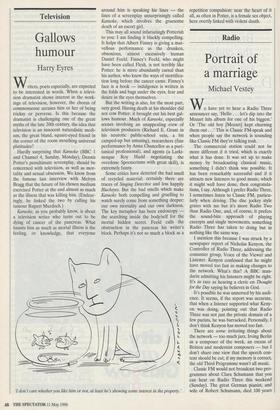Television
Gallows humour
Harry Eyres
Writers, poets especially, are expected to be interested in words. When a televi- sion dramatist shows interest in the work- ings of television, however, the chorus of commonsense accuses him or her of being tricksy or perverse. Is this because the dramatist is challenging one of the great myths of the late 20th century, the idea that television is an innocent naturalistic medi- um, the great bland, square-eyed friend in the corner of the room mouthing universal platitudes?
Hardly surprising that Karaoke (BBC 1 and Channel 4, Sunday, Monday), Dennis Potter's penultimate screenplay, should be concerned with television, as well as mor- tality and sexual obsession. We know from the famous last interview with Melvyn Bragg that the future of his chosen medium exercised Potter at the end almost as much as the illness that was killing him. (Endear- ingly, he linked the two by calling his tumour Rupert Murdoch.) Karaoke, as you probably know, is about a television writer who turns out to be dying of cancer of the pancreas. What haunts him as much as mortal illness is the feeling, or knowledge, that everyone around him is speaking his lines — the lines of a screenplay unsurprisingly called Karaoke, which involves the gruesome death of an escort girl.
This may all sound infuriatingly Potterish to you: I am finding it blackly compelling. It helps that Albert Finney is giving a mar- vellous performance as the drunken, obnoxious, almost excessively human Daniel Feeld. Finney's Feeld, who might have been called Flesh, is not terribly like Potter: he is more abundantly carnal than his author, who knew the ways of mortifica- tion long before the cancer came. Finney's face is a book — indulgence is written in the folds and bags under the eyes, fear and desire in the eyes themselves.
But the writing is also, for the most part, very good. Having death at his shoulder did not cow Potter: it brought out his best gal- lows humour. Much of Karaoke, especially scenes involving an unappealing crew of television producers (Richard E. Grant in his neurotic public-school vein, a bit camped-up but amusing), researchers (fine performance by Anna Chancellor as a puri- tanical professional), and agents (a Larki- nesque Roy Hudd negotiating the overdone Spoonerisms with great skill), is extremely funny.
Some critics have detected the bad smell of recycled material: certainly there are traces of Singing Detective and less happily Blackeyes. But the bad smells which make Karaoke both compelling and gruelling to watch surely come from something deeper: our own mortality and our own darkness. The key metaphor has been endoscopy the searching inside the body/self for the mortal hidden secret. Feeld calls the obstruction in the pancreas his writer's block. Perhaps it's not so much a block as a 'I don't care whether you like him or not, at least he's showing some interest in the property.' repetition compulsion: near the heart of it all, as often in Potter, is a female sex object, here overtly linked with violent death.


































































 Previous page
Previous page